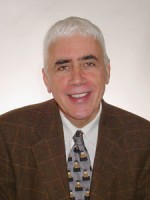Title
For many musicians, when allergy season hits, it can be a mild inconvenience, but for a singer, it can wreak havoc. Dealing with allergies and other vocal health issues was the focus of a lecture given by Anthony Jahn, a well-known otolaryngologist who spoke with a group of Juilliard singers on September 11 in Room 335.
Body
Dr. Jahn was invited to Juilliard by the Health and Counseling Services as part of its ongoing outreach efforts. Health and Counseling Services has an expanding menu of educational outreach programs which it brings into the classrooms and rehearsal halls of the School. Dr. Jahn—an ear, nose, and throat specialist who writes a monthly column for Classical Singer magazine—came to provide the singers with valuable advice on how to keep their vocal chords healthy.
His program began with a discussion of his “Ten Tips for a Healthy Voice,” which focuses on staying healthy and keeping the vocal mechanism hydrated. Young singers are “works in progress,” he explained, because they are still developing vocally and technically, and they face different challenges from those of industry veterans. Juilliard singers were encouraged not only to avoid straining their vocal mechanisms by refraining from screaming and even speaking with improper technique, but also by avoiding loud spaces, which can be particularly difficult for a young person in New York. Additionally, college students live in close proximity to each other and are particularly susceptible to colds, the flu, and other viruses. In fact, according to Caroline Greenleaf, director of health and counseling services, most of the ailments that singers present with are viral. Since many treatment options for viruses are palliative, students often face the choice of missing important practice and rehearsal time while resting or “singing through it,” risking injury. Dr. Jahn’s counsel: “If you have any acute health problem that impairs your ability to sing, such as a viral infection, my advice is to rest the voice and your body, to allow for normal healing to take place.” He did note, however, that if the voice is not back to normal within one week of complete vocal rest, a medical practitioner should be consulted.
The majority of the presentation, though, was a question-and-answer session. Second-year undergraduate singer Lilla Heinrich appreciated the opportunity not only to ask questions, but also to hear the responses to her classmates’ questions. “We all know a lot, already, about how to stay healthy in this industry,” she said, “but it’s those questions you’ve always wanted to ask a true professional that are the most useful for everyone.”
Most of the questions and answers revolved around the effects of different prescription and over-the-counter medications, as well as at-home practices, such as the use of humidifiers and a particular nasal douche. A few students, though, asked about more extreme measures to improve range and preserve health, such as elective surgery. While Dr. Jahn acknowledged occasional positive side benefits of particular surgeries, he does not recommend procedures that are not medical necessities. “Vocal health,” he said, “especially in young singers, is focused on prevention of singing-related injuries, and maintaining a generally healthy body and mind.”
As the session progressed, some of the students, including Heinrich, asked questions specific to their own situations. Heinrich, for example, learned that one of her current medications could be causing hoarseness, and Dr. Jahn was able to offer some homeopathic remedies that might not have the same side effects. Considering how delicate the vocal mechanism is, and how obviously linked its performance is to overall health, the singers’ questions often returned to quick recovery from allergies and illness and prevention of injury or loss of range. “Most young singers are healthy,” Dr. Jahn believes, “and by following some common-sense suggestions about diet, exercise, and voice conservation, will be able to avoid any serious vocal problems.” Accordingly, while he offered his professional opinion about different medications, much of his advice centered on general good-health practices, such as sufficient water intake and retention.
Dr. Jahn’s visit represents one way that Health and Counseling Services is extending into the classroom. In addition to similar visits from experts, and the physical therapy sessions with dance and orchestra students, physician assistant Cheryl Heaton visits dance and drama classes each year, without the presence of staff and faculty members, encouraging candid questions on a variety of topics. Health and Counseling Services will also be bringing in a new consultant and nutritionist who will work with dancers and in the first-year Colloquium; the health and fitness interest group, part of Residence Life’s new initiative, already has a “healthy” contingent of members. The Juilliard School’s Health and Counseling Services provides free primary health care and counseling services to all enrolled undergraduate and graduate students at the School, and is located on the 22nd floor of the Meredith Willson Residence Hall.





